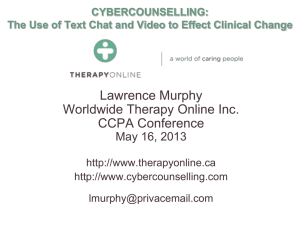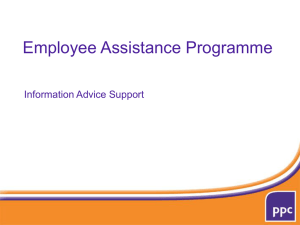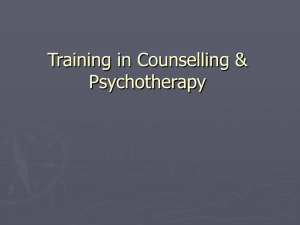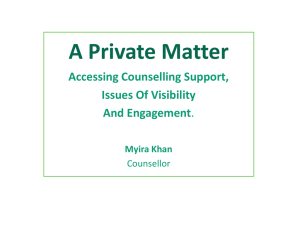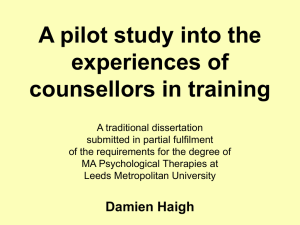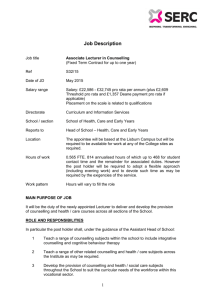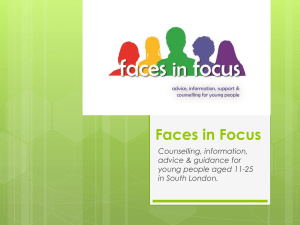Here - Guidance & Counselling Matters
advertisement
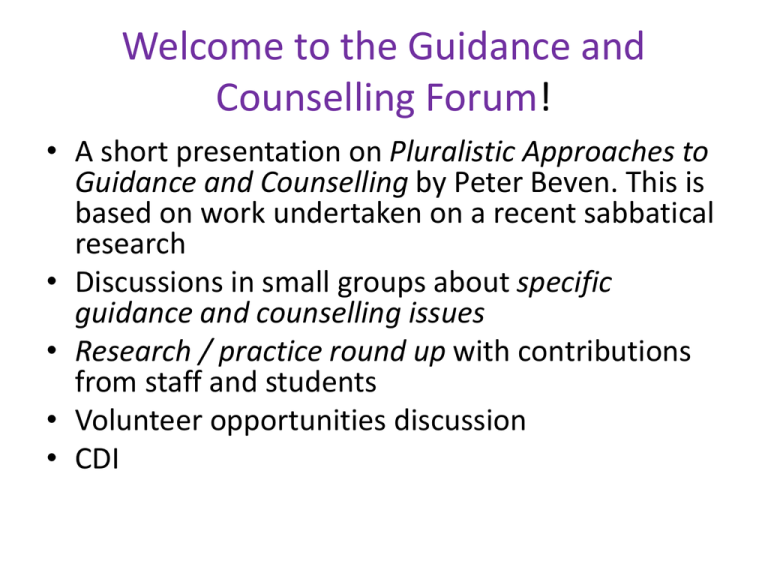
Welcome to the Guidance and Counselling Forum! • A short presentation on Pluralistic Approaches to Guidance and Counselling by Peter Beven. This is based on work undertaken on a recent sabbatical research • Discussions in small groups about specific guidance and counselling issues • Research / practice round up with contributions from staff and students • Volunteer opportunities discussion • CDI Pluralistic Approaches to Guidance and Counselling Peter Beven Northumbria University October 2014 In Japan, an estimated 700,000 young people, known as hikikomori, have withdrawn from society, rarely leaving home. In the United States, the still faltering economy has been so difficult for the so-called ‘Generation Y’ that there is even a television show, Underemployed, about a group of 20-something college graduates forced into dead-end or unpaid jobs. It is a comedy, but of the laughter-through-tears variety. In Europe young people out of work or underemployed has increased as the recession deepened and more older people enter the job market. Worldwide, young people are three times more likely than their parents to be out of work. In Greece, Spain, and South Africa, more than half of young people are unemployed, and jobless levels of 25 percent or more are common in Europe, the Middle East, and Northern Africa. (Mourshed, Farrell and Barton, 2012) Young People and Unemployment • EU Youth unemployment has been double or three times rate of general unemployment for the last 20 years • 5.6 million unemployed across EU • 7.5 million not in education or work (Mourshed, Patel and Suder, 2014) Transition from Education to Employment • For many transition highly problematic • McKinsey survey (2014) in eight European countries: attitudinal and behavioural items • Those seeing themselves as successful- actively manage their decisions about education and career • Significant numbers feel disheartened, disengaged and struggling (Mourshed, Patel and Suder, 2014) Career Counselling Support • Arguably the need for career guidance support greater than ever • Huge variation across Europe in terms of professional training available (Barham, 2009) • In some countries (including England) policy decisions have restricted the nature of support to young people (Reid and West, 2011) The Technicising of Guidance • ‘…in a situation where guidance work has become more complex it appears that preparation for the work may have diminished, being restricted to a powerful and instrumental discourse in guidance in the UK…’ (Reid and West, 2011:399) Reimagining Career Counselling • As a starting point there is a need to recognise that individuals have different needs at different points of time. • Motivation will vary between individuals, but also within an individual depending upon current concerns (Miller and Rollnick, 2013). Decision making styles adopted by individuals also have a factor. Role of attitude and motivation • Drawing upon their longitudinal study of the effectiveness of career guidance with adult clients, Bimrose and Barnes note: ‘The extent to which individuals espouse an evaluative, strategic, aspirational or opportunistic approach to making decisions about their career progression is crucial to understanding the particular types of support required from guidance practice’ (Bimrose and Barnes, 2008:vi) The needs of individuals For some… • A placing or matching service taking account heir abilities may be what is required For others… • …May require support with more complex decisions involving reflection, self assessment and career planning ONE SIZE DOES NOT FIT ALL! The matching model • Matching model variations of trait / factor paradigm, introduced in industrial societies with relatively high employment • Assumes that individual have a strong work ethic and be happy with the match; hence society and the individual will benefit Critiques of the matching model • Assumption of a stable labour market can be challenged (Bimrose, 2009) • The notion of ‘career’ has changed considerably (Young and Collin, 2000) • Questions raised with its non engagement with gender issues (Bimrose, 2001), culturally varied groups (Mobley and Slaney, 1998), and socially deprived backgrounds (Meara et al., 1997) research evidence Evidence from Counselling and Psychotherapy: “Distant cousins” to career counselling • Different clients want different things e.g. Study by King et al., 2000) • Clients do better in their preferred therapies (Swift and Callahan review, 2009) • This also resonates with research on career decision making (Bimrose and Barnes, 2008) Different clients want different things • King et al, 2000: Do depressed clients in primary care want non-directive counselling or cognitivebehaviour therapy? 40% NDC CBT 60% ethics of Diversity Diverse needs because diverse human values • If we accept that different people have different values (e.g., happiness, actualisation, morality, duty, meaning) is ultimately ‘good’, and…. • We accept that it is valid/positive for different values to exist (‘value pluralism’), and… • We see the different therapies as being aligned with different values (e.g., happiness/CBT, actualisation/humanistic, meaning/existential, then… • Diversity of therapeutic approaches is essential Pluralism and Career Counselling • Engagement with clients to ascertain what might be most helpful • What do clients want (goals) and • How might they best be helped to achieve it (method) • The co-construction of perspective and methods • Need a menu of alternatives • Ongoing reflection and contracting… Case Study • Sheila has been out of work for 6 months, is looking after an elderly relative. She is unhappy about having little money and wants to get back into some sort of employment. • What different approaches might there be? What are some of the difficulties in moving towards pluralistic approaches?


